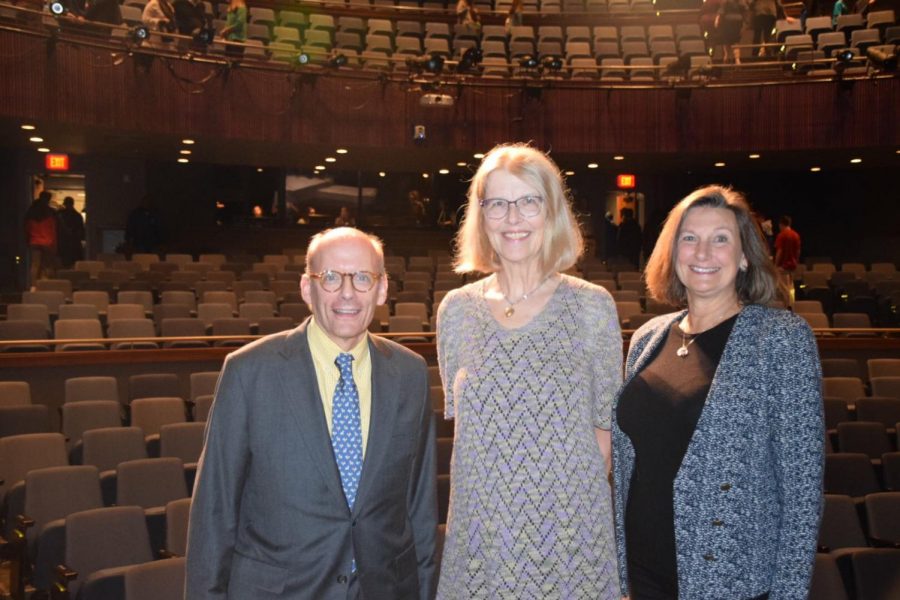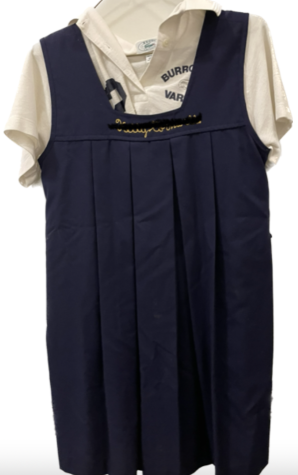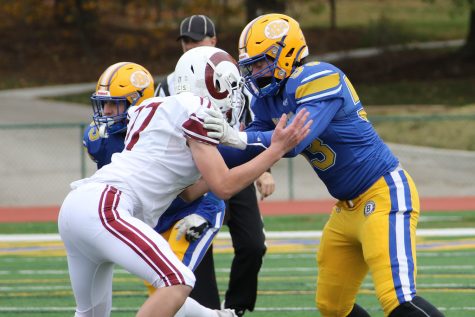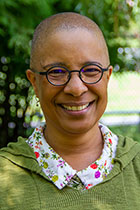Jane Smiley: A Pulitzer Alum
Jane Smiley ‘67 poses with president Tom Kahn ‘71 (left) and Beth Louis ‘72 (right) after the Alumni Awards assembly.
How does a California-born, St. Louis-raised, Vassar-educated woman become a Pulitzer Prize-winning novelist known for her settings of Iowa farmland? Well, Jane Smiley ‘67 “got there by accident.”
“My husband at the time got into the University of Iowa and the University of Virginia, and I didn’t get into either one.” Smiley continues, “Because he was from Wyoming and he loved going back there—he now lives in Iowa City actually—he wanted us to go to Iowa so we would be at least a little bit closer to Wyoming than if we were in Virginia. So we ended up in Iowa City.”
While Smiley would ultimately earn a PhD and a Master of Fine Arts degree from the University of Iowa—a process she classified as “worming” her way into the programs—the foundation of her interest in the countryside came shortly after her move, living on a farmhouse thirty miles outside of Iowa City. “There was stuff coming out about pesticides, there was stuff coming out about farming, and here we were living out in the middle of farm country,” she recalls. “I would wander around the roads, and I’d look at the fields and I’d imagine. I’d look out at the water in the well, what was going on…. It just got me going.”
And go, she did. Since her literary debut in 1980 with Barn Blind, Smiley has managed to wedge her way into the apogee of the American literary discussion and stay there, equal parts prolific, ambitious and adroit. What’s most astonishing upon examination of her nearly thirty works of literature is the breadth of writing; no genre has remained untouched by the ever “curious” and masterful Smiley. To even classify Smiley as a novelist proves problematic, as her award-winning short stories and essays can attest.
Her works range from an Icelandic epic to a satirical rendition of a Midwestern University, from collections of short stories musing on marriage to young adult horse-centric books, from a modern retelling of King Lear to biographies of physicists. When asked why she would write such a diverse, genre-busting collection, Smiley’s response is nearly automatic: “Why not?”
She elaborates, “I know I was going to do that from the beginning, and so it never occurred to me to not do it. In terms of publishing, I told my publisher and agent early on that I was going to play around and they were won over…. [It’s] what I wanted to do.”
Smiley, the reader, no surprise, boasts a literary repertoire and knowledge as impressive as the one Smiley, the writer, exhibits. In conversation, the former Iowa State professor mentions William Shakespeare, Nancy Drew, Elizabeth Gaskell, Don Quixote, Marguerite de Navarre, The Decameron, and Uncle Tom’s Cabin among other seminal literature and authors.
Smiley states that “for me, history and literature became one thing” thanks to her Burroughs freshman year European history class taught by Mr. James Alverson. The class not only “shaped [her] interest in medieval literature and history” but taught her “to get out of the bubble, pay attention to politics and culture.”
Interest and awareness, alike, combine into insightful commentary on literary history, a topic Smiley mediated on in her nonfiction Thirteen Ways of Looking at the Novel. Smiley surmises, “Don Quixote didn’t start the novel — he started feeling, the inner life, what it means to connect. The male side of the novel is really about what it means to go out into the world. Eventually, this meshed into the novel that we know now as the novel because we expect, currently, a novel to get deeper and deeper into the mind and the feelings of the characters—that’s what we want to learn from the novel.”
Smiley’s experiences at Burroughs, beyond Mr. Alverson’s classroom, affect her and her writings to this day. Smiley claims, “I think it is true for all writers that what you read and learn when you are twelve, thirteen and fourteen is what shapes your future work—how you approach it, what you think is worth doing, what you yourself like to read.”
It may surprise some to hear that Smiley, the renowned author of feminist-centric novels, attributes two male writers as her most significant authors. She explains, “The fact that I always mention male authors as my big influence is because those are the ones I had to read, those are the ones I did read and so those are the ones that I learned from when the time was right.”
While Smiley read female-penned books like Black Beauty, Nancy Drew, and the Bobbsey Twins “on [her] own,” the lack of female authors taught in school made quite the impression. Of books like Middlemarch and authors like Jane Austen, she says, “It was almost like because we didn’t know about that or them at school they didn’t have the stamp of approval.”
When teaching at Iowa State, Smiley remembers “asking my freshman how many of them read books by male authors, and everybody raised their hands. Then I asked them how many of them read books by females — only the girls raised their hands.” She further states: “The problem is, if you’re not reading books by women authors, you aren’t looking into the inner lives of young girls and you don’t become curious about them because you aren’t being required to read them.”
She suggests, “I think a really good book they should read in seventh grade is Black Beauty because it is very affecting. It’s very insightful into cruelty to animals, and it was extremely important in its day. And another I think they should be reading is Uncle Tom’s Cabin. That’s one of my favorite books.”
One of Smiley’s favorite stories relates to the shared connection of readership. She came to know a woman (“probably through the internet,” she guesses) who was being raised in Russia around the same time that Smiley was attending Burroughs. She describes: “One of the books we read—I think it was in eleventh grade—was Crime and Punishment. I totally adored it, and there was a scene where the horse is pulling a carriage down the cobblestones in St. Petersburg and he falls to his knees. It’s a very sad scene, and it was just totally vivid in my mind. The same time, this woman was reading Huckleberry Finn. Well, I could look out over the river—who gives a s***, you know? I looked out over the river all the time, so Huckleberry Finn didn’t actually resonate… But she adored it.
“The thing I remember is my vision in my mind of St. Petersburg was completely wrong. Her vision in her mind of the Mississippi River was completely wrong. But it meant something to us. We embraced that vision. And that’s what reading is for: learning about things and imagining them and caring about them because they’re so vivid in your mind.”
Smiley has never shied away from addressing political and social issues. She wrote Ten Days in the Hills in response to the Iraq War, and she has frequently tackled topics such as feminism, divorce and more in essays and articles. Of how the current political climate will affect her works, Smiley says with a shrug, “I don’t know. That’s something you find out afterwards.”
As a writer, though, Smiley tells the stories she wants to tell; her evaluation of whether a story is worth telling boils down to, in her words, “Whether I’m interested in it.” She says, “There are so many different kinds of readers, and they all want different things. I just write what I think is important for that particular idea and hope that it finds a reader.”
Dr. Des Prez adds, “She made it clear that a lot of her projects start that way, with an idea of pursuing a certain type of story and giving it a twist—an unexpected, setting, or an animal protagonist, or any number of things. Then she gets fully engaged in meeting the challenges she sets for herself. She takes joy in the challenge.”
Smiley is a natural story-teller, and she certainly possesses life experiences from which to weave rich yarns. The self-professed “oddball” credits her time at Burroughs with getting her into “the habit, one that has served [her] well as a writer, of watching, eavesdropping and noting interesting interactions.”
Since her graduation from Burroughs, Smiley has often found herself in unique situations. Take for instance, the summer she spent living on a Maoist commune in Connecticut with her boyfriend.
“Mostly, it was funny,” she divulges, “I sort of thought of myself as a Maoist-in-law. It was interesting to listen to the things they would argue about; they would argue about some of the weirdest things…. There was guy in the commune named John Parks. P-A-R-K-S. He was from a wealthy family—they were all Yale guys. One night, we talked for an hour or more about whether he should change the spelling of his name to P-A-R-X in honor of Karl Marx. Half of me was saying, ‘This is absurd’ and half of me was saying, ‘This is really interesting from a novelist’s point of view.’”
Although critics, readers and award foundations have proved more than willing to heap praise onto Smiley, the writer herself modestly claims of her abilities, “I don’t think you ever say, ‘I’m really good.’ What you hope to be able to say is ‘I’m good enough to get this done,’ but it’s not for you to judge your writing.”
Smiley continues, “The thing I always say about writing is, as soon as I close the manuscript and send it off, it nows belongs to the reader…. That’s the essential freedom of the reader. The reader now possesses the book, and it’s entirely up to the reader to say, ‘I love this, I adore this’ or ‘This is a piece of s***.’ Once my books are done, for me, I become a reader, and I can say ‘I love this, I adore this’ or ‘This is a piece of s***,’ just like any other reader.”
Though Smiley brings an added layer as a reader by also being the writer, she states, “My opinion is no more important than any other reader’s opinion,” but she admits with a laugh, “Lots of times I’m reading something and I think, ‘I didn’t even realize I knew how to do that.’” Of her works, she “likes them all for different reasons”—Greenlanders because it was “so weird to write;” Moo because “it made me laugh;” Horse Heaven because “there are so many horses in it.”
A Thousand Acres, a modern retelling of King Lear in a prairie and the 1991 Pulitzer Prize winner for Fiction, will forever be mentioned in conjunction with Smiley. She considers herself “lucky” because, “When I won the Pulitzer, I was pregnant and so I couldn’t go out and be famous. I got some flowers, I got some congratulations, and then I got bigger advances…. I was already onto the next project [Moo], so I didn’t have any feeling of ‘Oh s***, I have to meet the challenge.’” While her writing process may not have changed post-Pulitzer, Smiley did notice, “I got a lot more money!”
Des Prez remarks, “To have a Pulitzer prize winner in our assembly hall and in my classroom is, in some ways, like having any other career writer to visit: it gives all of us a chance to learn from someone who has made a whole life out of making things out of words…. That Smiley has also won a Pulitzer shows the level of public acclaim her achievement has received. But her real achievement, in my view, is her joyous commitment—that she has been at it daily, engaging the challenges of drafting and revising stories and essays, for nearly half a century, and she has clearly had such fun with it.”
In her speech accepting the Outstanding Alumni Award on the occasion of her fiftieth high school reunion, Smiley declared, “So, am I saying that Burroughs made me? There were other influences, too— horses, my talkative and funny family, St. Louis county, being a baby boomer. But as I thank you for this alumni award, I thank you also for too many memories to count, all of them either good or funny or enlightening.”
Walking through the halls, Smiley is quick to point out all the changes that have occurred since she last walked them as a student—the artwork on the walls, the new buildings. As the loud clanging signals a new period, she notes with a cringe one similarity: the bells are “the exact same.”







